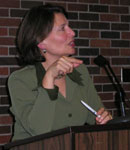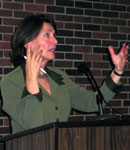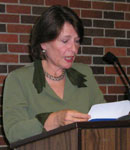|
||
| Return to CORP homepage |
 Geneva Overholser Bridging the Gap Between Faith and Reason
By Katie Bauer  Standing
confidently at the lectern, she gazed out over the packed audience
in Fisher Auditorium and made a surprising comment. Standing
confidently at the lectern, she gazed out over the packed audience
in Fisher Auditorium and made a surprising comment.
"The scarcity and poor quality of religion coverage is being noticed," she declared. And the stories, she said, should be "much more probing." This critique of religion coverage might be less surprising had it come from the mouth of a pastor, parishioner, imam or bishop. However, it was voiced by Geneva Overholser, who started as a reporter for the Colorado Springs Sun, freelanced from Africa and Europe, and rose to serve as editor of the Des Moines Register from 1988 to 1995 during which the newspaper won a Pulitzer Prize for public service. Now, Overholser lives and serves in Washington, D.C., as the Curtis B. Hurley Chair in Public Affairs Reporting for the Missouri School of Journalism.
The daughter of a Presbyterian minister, Overholser said that throughout her youth, the congregation had a strong influence in her life and she took an active role in its community. In fact, Overholser said she came to journalism 35 years ago as a "spiritual calling."
"Journalism feels like a mission, and it's worth putting your soul into," she said. "It's valuable work to society." However, Overholser said that journalism currently is "a spiritual calling in crisis." She noted that much of the religion coverage in the media today is the "what time are Sunday services" sort. Too often, the topics thought to be controversial are avoided for fear of offending someone, she said.Yet religion and spirituality are subjects powerfully important to many people. She said that perhaps "nothing could ill-serve the media or society more" than failing to cover these topics with depth and insight. "Ignorance-not to mention a great deal of pressure-builds up when subjects go undiscussed-and when they go uncovered," Overholser said. "It's all the more important to write about difficult topics." Overholser said journalists must move beyond reporting merely the times of religious services. They must begin to learn and convey to readers the beliefs and practices of various religions. Reporters must be willing to listen to people tell their spiritual journeys, she said, and avoid the "simple notions, stereotypes and conventional wisdom" about religions. Despite the challenges of increased religious diversity in America, journalists must learn to report accurately the nation's more varied dimensions of religion and spirituality, in Overholser's view. This lack of journalistic range and sensitivity in religion news coverage is related to what Overholser sees as the two main challenges to reporters and editors today-the current state of the ideal of objectivity and pressures by the business side on the practice of journalism. Overholser explained that people in the United States have grown up with the idea that news and opinion should be kept separate. Not that the media always succeed in such separation, she said, but the pursuit of it has been an ideal. People have tended to shy away from reporting on subjects as subjective as religion or faith. But now things are changing, she said. Both media outlets and media audiences are becoming more partisan, and readers and journalists aren't convinced that objectivity is still the ideal. Overholser mentioned that Fox News, which often includes value-laden language, received the highest Nielsen ratings-that is, a larger audience than any competitor, cable or broadcast-at the recent GOP Convention. Overholser suggested that this diversity of views might actually be beneficial for the country. She mentioned that in their pursuit to be entirely objective, reporters inadvertently often withhold information that readers might like or need to have. "The media landscape is becoming more partisan, but I'm not sure we shouldn't welcome it," she said.
Overholser expressed concern that the growing trend toward publicly traded corporate ownership of media outlets is eliminating the once dominant practice of ownership by families. This trend has resulted in catering to advertisers rather than readers. More attention has been given to increasing corporate profits than to improving how well news organizations report and edit the news, Overholser said. "Now we chase the consumer instead of responding to the citizen's needs," Overholser said. "The primary purpose [of news organizations] to serve citizens has been overtaken by profit pursuits." And this relates to the problem of the nation's sparse religion news coverage. "Commercially driven enterprises don't take risks," she said. "They like to avoid offending anyone. And real digging stories about faith are bound to trigger heated feelings. Better simply to avoid it." But Overholser said that despite the challenges of journalism, she does feel fairly hopeful. "When a situation gets bad enough, people do something about it," she said. "That's where we are now." Overholser offered two solutions for reviving the profession of journalism: the concepts of transparency and accountability. "Transparency is forthrightness about who we are and what our goals are as journalists, as individual media," Overholser said. "We need to tell people how we selected our sources, who they are and why they spoke to us." These steps are necessary, she said, because most people in today's culture do not trust journalists. The other step, accountability, is "acknowledging our mistakes"-the kind of thing that has been happening recently in the Washington Post and New York Times discussions about pre-war coverage, Overholser said. She suggested ways that journalists can hold themselves accountable: through the help of ombudsmen (reader representatives), reader advisory councils, editor's columns on how the journalistic process works, inclusion of citizens in news and editorial meetings, media reporting on other media and state news councils. She said even online sites such as Grade the News can provide valuable feedback to hold news organizations accountable. "You have to think about ethics," Overholser said. "Sometimes people get in the workplace and forget. It takes a constant mindfulness." Katie Bauer is a master's student at the Missouri School of Journalism. |
Links in archives are not maintained. |


 Her
appeal for better religion journalism was part of a lecture that
kicked off the six-part 2004-2005 Distinguished Lecture Series of
MU's Center for Religion, the Professions and the Public. Her lecture, "Toward
a New Media Ethic for a New Media Environment,"
addressed the ethical, moral and religious aspects of journalism.
A nationally active speaker and commentator on media performance,
Overholser's journalism teaching and media analysis also draw on
her earlier experience on the New York Times' editorial board and
as ombudsman for the Washington Post.
Her
appeal for better religion journalism was part of a lecture that
kicked off the six-part 2004-2005 Distinguished Lecture Series of
MU's Center for Religion, the Professions and the Public. Her lecture, "Toward
a New Media Ethic for a New Media Environment,"
addressed the ethical, moral and religious aspects of journalism.
A nationally active speaker and commentator on media performance,
Overholser's journalism teaching and media analysis also draw on
her earlier experience on the New York Times' editorial board and
as ombudsman for the Washington Post. In
Overholser's view, more opinion
and less fear about covering the
subjective in the media could contribute
to improvements in the coverage
of religion, faith and spirituality.
In
Overholser's view, more opinion
and less fear about covering the
subjective in the media could contribute
to improvements in the coverage
of religion, faith and spirituality.